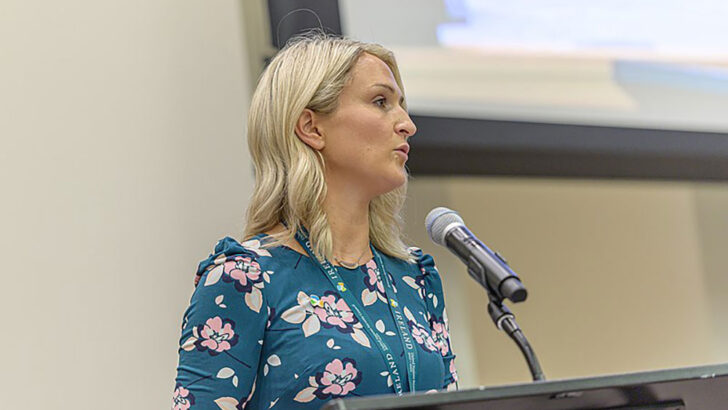Last week started with US President Joe Biden calling for a cooling of the temperature of public discourse. The week ended with him bowing out of the presidential race.
On Morning Ireland (RTÉ Radio 1, Tuesday) Luke Ming Flanagan MEP hadn’t got the Biden memo on cooling and called Ursula Von Der Leyen a “monster”. The interviewer made a limp attempt to challenge him on that, but he doubled down. On the ugly Coolock riots, that piggybacked on peaceful protests, Garda Commissioner Drew Harris defended the actions of the Gardaí in quelling the disturbances and criticised ‘misinformation and disinformation’ on social media. I was genuinely curious to know exactly what this false information was but despite a question leading in that direction from Crime Correspondent Paul Reynolds, we didn’t get any detail and the question wasn’t pursued. Too often of late I find myself drawing attention to questions not asked or questions not answered.
Later, on The News at One (RTÉ Radio 1, Tuesday), Paul Rogers of Northside Partnership in Dublin, in a very moderate and balanced contribution spoke of there being little engagement from Government, but significantly he said that what little there was involved communication not consultation. He also referenced ‘misinformation and disinformation’, but again wasn’t asked for, and didn’t give examples. I don’t doubt that there is ‘misinformation and disinformation’ online, and not all of it coming from the ‘far right’, but the cure for that is to clearly identify it and then show why it is wrong. That night on the Nine News, Justice Minister Helen McEntee also gave out about the phenomenon, without examples, but she had a trio – ‘misinformation, disinformation and discourse’. Is discourse now a problem?
By Wednesday the anti-immigrant situation had taken more sinister turns with a physical attack on a migrant camp on City Quay in Dublin. On Drivetime (RTÉ Radio 1, Wednesday) presenter Sarah McInerney seemed surprised and shocked when a volunteer that had been helping the migrants, described many more such attacks than we’d heard of previously. That show also featured protestors from Dundrum, Co. Tipperary, who didn’t want their local hotel used for large numbers of asylum seekers. It was obvious that a huge loss of trust in Government is at the heart of this crisis.
It took until Friday’s Drivetime programme before I heard any explanation or example of the ‘misinformation and disinformation’ – it seems that a local business in Coolock had been wrongly accused of facilitating access to an asylum seeker centre. Still, by last Monday’s Morning Ireland (RTÉ Radio 1) there were still disturbances in Coolock, with a fourth fire being set – a bewildering lapse in security.
Another big media story of the week was the aftermath of the Trump assassination attempt and his triumphant nomination as the Republican Party candidate for the presidential election. I cringed somewhat when I heard Trump claiming he had God on his side – I always get nervous when I hear politicians saying that. Initially it was a more muted Trump, but later in the week he lapsed, or reverted to form, especially when Vice President Kamala Harris looked likely to be Biden’s replacement. His mockery of her was sour, though the prospect of her being President doesn’t bode well – on last Monday’s Morning Ireland one of her qualities mentioned was her support for ‘abortion rights’. Her ‘electability’ was a big issue for commentators, but suitability should surely trump that? Journalist Larry Donnelly thought that Biden had ‘caved to political reality’ but that Harris had a problem with her failures in relation to cross border immigration and her ties to Black Lives Matter. Uncooled conflicts ahead!
Fictional conflicts are easier to take. Douglas is Cancelled (ITV, Thursdays), a drama series about a newsreader (Hugh Bonneville) in trouble for a sexist joke, ended last week with an episode of sustained tension. It had started as a sharp and witty sendup of woke culture but became more serious and darker. In the last episode there was a re-injection of humour, some of it crude, but also some very serious elements skewering the mistreatment of women in a media environment. If there was uneasy laughter there were tears too as uncomfortable truths were exposed, including in Douglas’ own family, and especially in relation to his disillusioned daughter.
It was one of those shows that left you thinking and talking after the credits.
PICK OF THE WEEK
Songs of Praise
BBC Two Sunday July 25, 1.15pm
As the Paris 2024 Olympic Games begin, Laura Wright is in Edinburgh to celebrate the faith of Olympians and Paralympians past and present.
LITTLE MARGARET OF CASTELLO
EWTN Sunday July 28, 9pm
This moving program explains the story of the little hunchback, Margaret of Castello. Blind and crippled from birth, Little Margaret’s simple, yet great faith leads us to greater love of Jesus. No streaming, satellite only.
Life and Soul
RTE One Monday July 29, 11.55pm
Creed ‘N Country: John Creedon examines the latest Census figures on religion, to understand what they reveal about shifting patterns of faith, culture and community in contemporary Ireland.


 Brendan O’Regan
Brendan O’Regan Helen McEntee. Photo: 2019 Comprehensive Test-Ban Treaty Article XIV Conference
Helen McEntee. Photo: 2019 Comprehensive Test-Ban Treaty Article XIV Conference